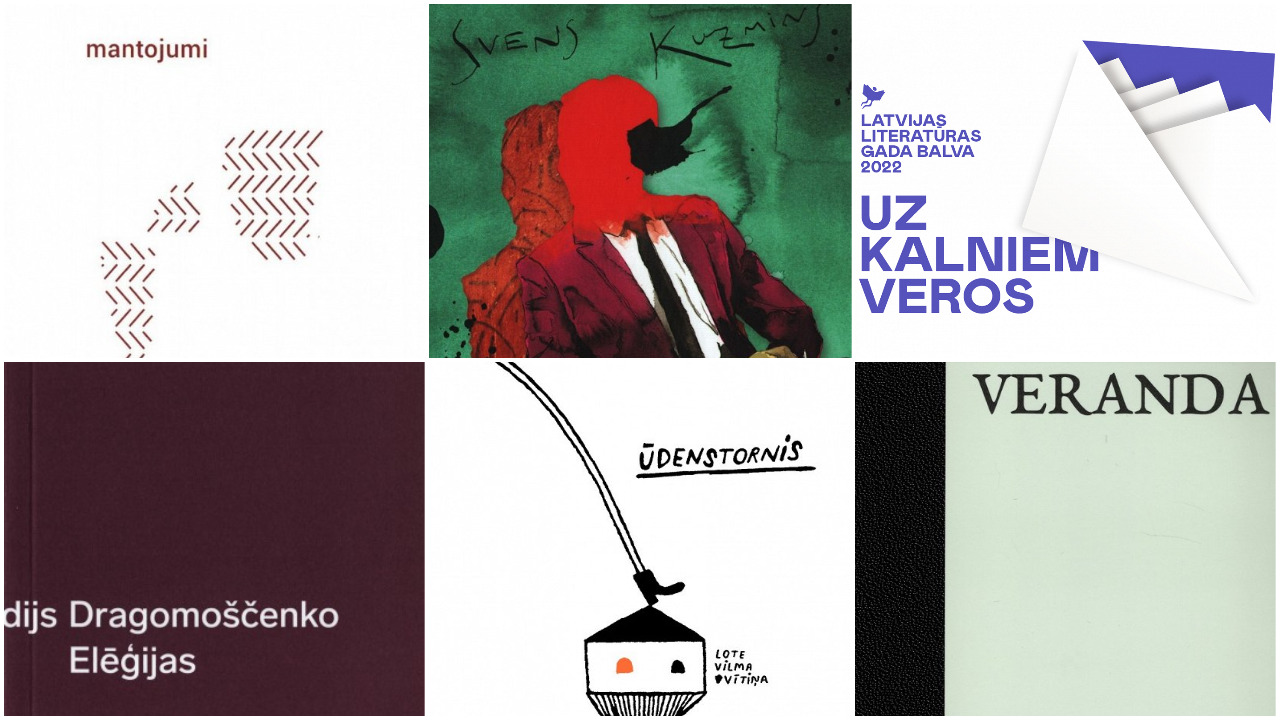Inese Zandere’s collection “Legacies” won the Latvian Literature of the Year Award for the best poetry, and Sven Kuzmin’s novel “Dizažio” won the best prose work in foreign literature. but as the best original literary work for children, Lotte Vilma Vītiņa’s poetry work “Water Tower” triumphed, and Anna Belkovska was awarded the brightest debut for her poetry collection “Veranda”. This year, the prize for a lifetime contribution was presented to the poet, prose writer and translator Daina Avotiņa, while special prizes were awarded to the translator Margarita Karbonaro and the creators of Manifests. From Futurism to the Present (Neputns Publishing House, compiled by Artis Ostups).
Asked how the LALIGABA jury worked and whether the evaluation took place differently than in previous years, Ivars Šteinbergs says that the differences in the agenda were: “First of all, one of the jury members – Raimonds Jaks – lives in Hong Kong. not only because of the pandemic, but also because we could not physically get together in one country, we met through computer screens, which in turn meant that all the books were also available electronically. [..]. I believe that the remote format can be maintained. “He also points out that the long list of nominees for the prize is always, this year alone, compared to other times, it published: “So far, as far as I understand, the long list has been for internal use to roughly understand which works should be nominated. But this year, to highlight more work to draw attention to the works we still want to praise, the long list was published on the website. “
When asked by Ieva Kolmane whether the jury has recommended any work this time, Steinberg answers in the affirmative and reveals that she has pushed some books that the publishers had not published for some reason, for example, the collection of conceptual poetry by Krišjānis Zeļģis. “Adults”. Kolmane continues: “The system is logical – publishers are applying. In fact, it is a reverberation for publishers, because
publishers value their work and say what works best for them, and they recommend it. But the truth is that sometimes someone falls out or is forgotten, or by the publisher himself [ir] underrated.
Then it is very good to be reminded of this at an early stage. ”
Commenting on LALIGABA’s results, Anda Buševica said: “I already understand that presenting prizes is always a bit of a lottery, but there are several things that are not clear to me: how did the long list turn into a short one? “Grosvaldi” next to Inga Žoludes “Vendene lotus flower” “I do not see how the jury can decide which works to nominate or not.” “Doubt”.
Svena Kuzmina highlights Kolmane as one of the tops of Latvian literature “Design”: “It is very rare for me to be highly valued on a larger scale. I usually stay in the minority in all areas.
It seems to me that “Dizažio” is a very bright application, and I could tell you for quite some time why. It stands out in the background.
Thanks to the “Book of the Day” series, the background has become very homogeneous, and the “Book of the Day” series has caught up with everyone else who wants to write biographies. Kristīne Želves’ “Grosvaldi” is a pearl there, but there are a whole lot of biographical works that are, as I once said to myself – high-quality or lower-quality literature crossed with the yellow press. There is a new current that has started in recent years and I think there will be more. “She regrets that in the category” Debut ” in the list of finalists did not include Elīna Kokareviča’s collection of stories “Ghosts”: “It’s a bright and different thing compared to what we see.” Jānis Einfelda’s book “Grosvalds” by Želves has also been sad “Blessed Land” and in particular the novel by Richard Barga “Girls of Unmodern Slamp”which fell through the LALIGABA sieve.
Ivars Šteinbergs may also be disappointed, but in order to name something, he would have to review all the lists. Many of the nominees voted for by the poet and literary critic received the award. “For my part, I can say that I am very happy about the nominees and the winners,” he begins. “Besides, it’s because I love the job
despite some questions that arise, I think the jury managed to evaluate the books this year in a way that is quite similar to the general consensus among all readers.
At least I have that impression.
A member of the expert commission, poet and literary critic praise Anna Auziņa’s novel as a bright phenomenon in last year’s prose “Housing. Teresa’s Diary”, which, in his opinion, differs in terms of thematic novelty and stands out against all other books. From the category of poetry, Steinberg chooses to emphasize the collection of the laureate Inese Zandere “Legacies”: “In my opinion, this is a book that does what museums, for example, try to do – to make you feel like you’re part of something much bigger, from a broader narrative of history, that you have rich roots and the like – but she does it through a personal prism, and she does it very touchingly and powerfully. ” He is particularly pleased with the winners of the category “Translations” – the collection of Arkady Dragomoshch “Elegy”: “It’s a complicated text, but Arvis has dealt with it, creating a really good-sounding, clear, beautiful Latvian text that enriches our poetic scene and introduces our readers in this case not only to the avant-garde of the Russian-speaking author. basketbut basically introduces such American winds (because Dragomoshchenko was associated with the Americans, they translated each other).
Buševica names the book “The Lotus Flower of Vendene” as his favorite in the prose category: “Žolude has a great work as a literary scholar and a great work as a writer. [– monogrāfija par Jāni Poruku]. I want to see how he turns out. ” Walter Daksha, working alone, does wonderful things; The books of Elīna Kokareviča and Marija Dzeisla have been published by the House of Languages (a group of like-minded people who are not a publishing house).
I expect publishers to be evaluated next year as well. “
Should prose translations and rejections be separated on Mondays? Steinberg believes that it is a matter of funding – if there is more money, these categories can also be distinguished. He thinks that the same applies to the category of children’s literature and debut, namely that both poetry and prose works are evaluated together. Here’s his example: “I remembered another job in the ‘unfortunate category’ that is [Luīzes] Pastors’ Children of Happiness – a fantastic, adventurous book that deserves fame and recognition. But this time it competed with [Lotes Vilmas] A collection of poetic poems that are essentially a different category of genre. ”
Ieva Kolmane points out that historically, deciding on what categories are repeated from time to time (especially in recent years when it is applied for as a project). She continues:
“For translations – it has been the case that there are some, but there have been years when there are no applications, when there is only prose and there are very, very few in the cool. It depends on the contribution of a particular year.
The tradition of publishing books in books just ended. As if demand fell. It is not that it is not at all, but is it a separate category? And there is another category like literary studies. Sometimes it has been, sometimes it hasn’t been. ”
LaLiGaBa. Latvian Literature Annual Award Ceremony59min
—
–


